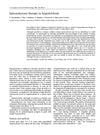 3 citations,
January 2022 in “Journal of Cosmetic Dermatology”
3 citations,
January 2022 in “Journal of Cosmetic Dermatology” Bicalutamide, a drug with a good safety profile, is a promising new treatment for female pattern hair loss.
3 citations,
May 2002 in “PubMed” The document concludes that treatment for excessive hair growth depends on the cause, with options including hair removal methods and medications like anti-androgens or insulin-sensitizing drugs.
 1 citations,
February 2022 in “Case reports in endocrinology”
1 citations,
February 2022 in “Case reports in endocrinology” An unusual growth of Leydig cells in a woman's ovaries caused her excessive hair growth, which was treated successfully with surgery.
 1 citations,
November 2011 in “Open access journal of contraception”
1 citations,
November 2011 in “Open access journal of contraception” Birth control pills with low-dose estrogen and antiandrogenic progestins can effectively treat acne.
August 2023 in “Frontiers in Oncology” New drugs and therapies targeting specific pathways show promise in treating advanced prostate cancer.
January 2016 in “AACE Clinical Case Reports” Treatment restored normal sexual characteristics and blood condition in a patient with testicular cancer.
February 2017 in “The Journal of urology/The journal of urology” Castration significantly reduces prostate size and BPH symptoms.
 April 2012 in “Faculty Opinions – Post-Publication Peer Review of the Biomedical Literature”
April 2012 in “Faculty Opinions – Post-Publication Peer Review of the Biomedical Literature” Early hair loss in men could be a sign of non-cancerous prostate enlargement, and treating hair loss early might help prevent prostate issues later.
 42 citations,
August 2017 in “Human Reproduction”
42 citations,
August 2017 in “Human Reproduction” Women with polycystic ovary syndrome tend to have a longer distance between the clitoris and anus.
 15 citations,
August 1998 in “Australasian journal of dermatology”
15 citations,
August 1998 in “Australasian journal of dermatology” The document concludes that various cosmetic and drug treatments are available for hirsutism, and some new drugs show promise.
 July 2023 in “Dermatology and Therapy”
July 2023 in “Dermatology and Therapy” 5-Alpha Reductase Inhibitors are effective for male hair loss and some skin conditions, but their effectiveness in women and safety concerns require careful use.
 September 2016 in “Gynecology Obstetrics and Reproductive Medicine”
September 2016 in “Gynecology Obstetrics and Reproductive Medicine” Effective treatment for skin issues in women with PCOS includes oral contraceptives, antiandrogens, and other medications and procedures.

Antiandrogens might help prevent or treat COVID-19 by blocking the virus's entry into cells.
 173 citations,
May 2001 in “Human reproduction update”
173 citations,
May 2001 in “Human reproduction update” Oestrogens are key for bone growth during puberty in both boys and girls.
 9 citations,
March 1985 in “Head & Neck Surgery”
9 citations,
March 1985 in “Head & Neck Surgery” Topical minoxidil is the most promising treatment for male pattern hair loss, but more research is needed to confirm its effectiveness and safety.
8 citations,
May 1991 in “PubMed” Hirsutism requires identifying the cause to choose the right treatment, which may include medications like oral contraceptives or dexamethasone.
 4 citations,
November 1996 in “European journal of endocrinology”
4 citations,
November 1996 in “European journal of endocrinology” Spironolactone may help treat excessive hair growth in girls, but more research is needed.
 1 citations,
April 2021 in “Undergraduate Research in Natural and Clinical Science and Technology (URNCST) Journal”
1 citations,
April 2021 in “Undergraduate Research in Natural and Clinical Science and Technology (URNCST) Journal” PCOS can harm heart health by increasing risks like high blood pressure and diabetes, but treatments like birth control and lifestyle changes can help.
 November 2013 in “John Wiley & Sons, Ltd eBooks”
November 2013 in “John Wiley & Sons, Ltd eBooks” Skin symptoms can indicate endocrine disorders and have various treatments.
200 citations,
August 2009 in “Experimental dermatology” Eating high-glycemic foods and drinking milk may worsen acne by increasing insulin and IGF-1 levels.
 145 citations,
March 2010 in “Fertility and Sterility”
145 citations,
March 2010 in “Fertility and Sterility” Different types of polycystic ovary syndrome (PCOS) have varying severity, with Type I being the most severe and common.
 75 citations,
June 1999 in “Pediatric Clinics of North America”
75 citations,
June 1999 in “Pediatric Clinics of North America” The document concludes that early recognition and treatment of PCOS in adolescents is crucial for managing symptoms and long-term health risks.
 30 citations,
June 1988 in “Journal of Steroid Biochemistry”
30 citations,
June 1988 in “Journal of Steroid Biochemistry” Flutamide combined with an LHRH agonist effectively inhibits prostate growth, suggesting it could treat prostate cancer.
 29 citations,
March 2021 in “Frontiers in Endocrinology”
29 citations,
March 2021 in “Frontiers in Endocrinology” Testosterone may influence COVID-19 severity and outcomes.
 11 citations,
August 2020 in “Diabetes”
11 citations,
August 2020 in “Diabetes” Testosterone helps human pancreatic cells increase insulin release.
 9 citations,
March 2021 in “Hormones”
9 citations,
March 2021 in “Hormones” COVID-19 may affect male fertility and women might have better outcomes due to hormonal and immune differences.
 8 citations,
February 2010 in “Journal of Dermatology”
8 citations,
February 2010 in “Journal of Dermatology” A topical treatment safely and effectively reduced acne by causing targeted cell death in sebaceous glands without side effects.
 April 2024 in “JCEM case reports”
April 2024 in “JCEM case reports” A woman's rare benign tumor that released both cortisol and testosterone was successfully removed, improving her health.
 February 2024 in “International Journal of Molecular Sciences”
February 2024 in “International Journal of Molecular Sciences” Hair loss in Androgenetic Alopecia is caused by genetics, aging, and lifestyle, leading to hair follicle shrinkage and related health risks.
 January 2023 in “International journal of homoeopathic sciences”
January 2023 in “International journal of homoeopathic sciences” Homeopathic remedies can help manage PCOS symptoms in girls aged 17-21.
























